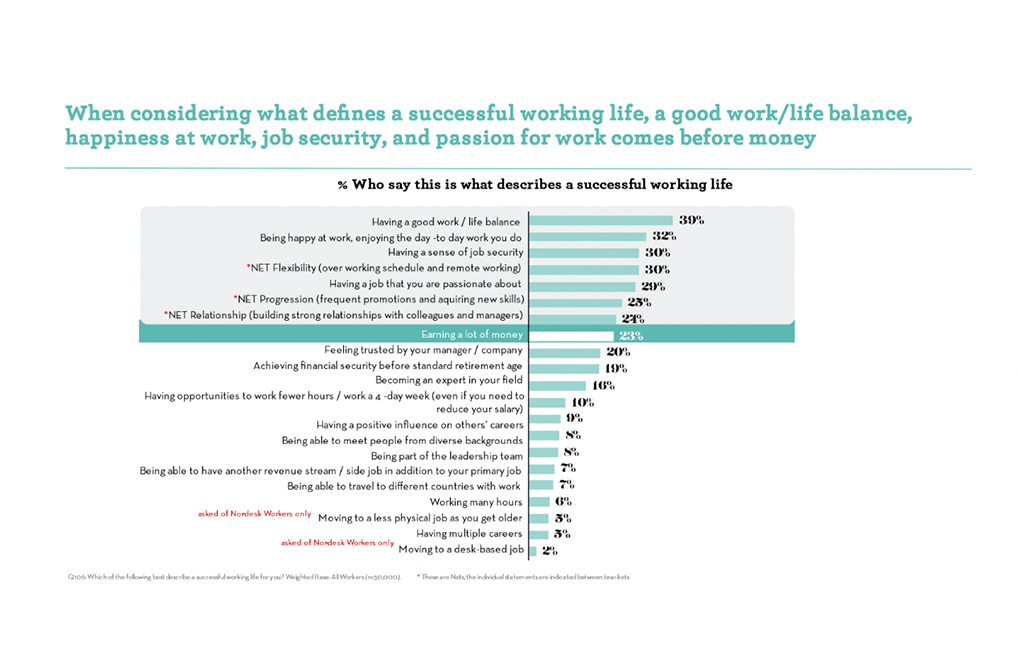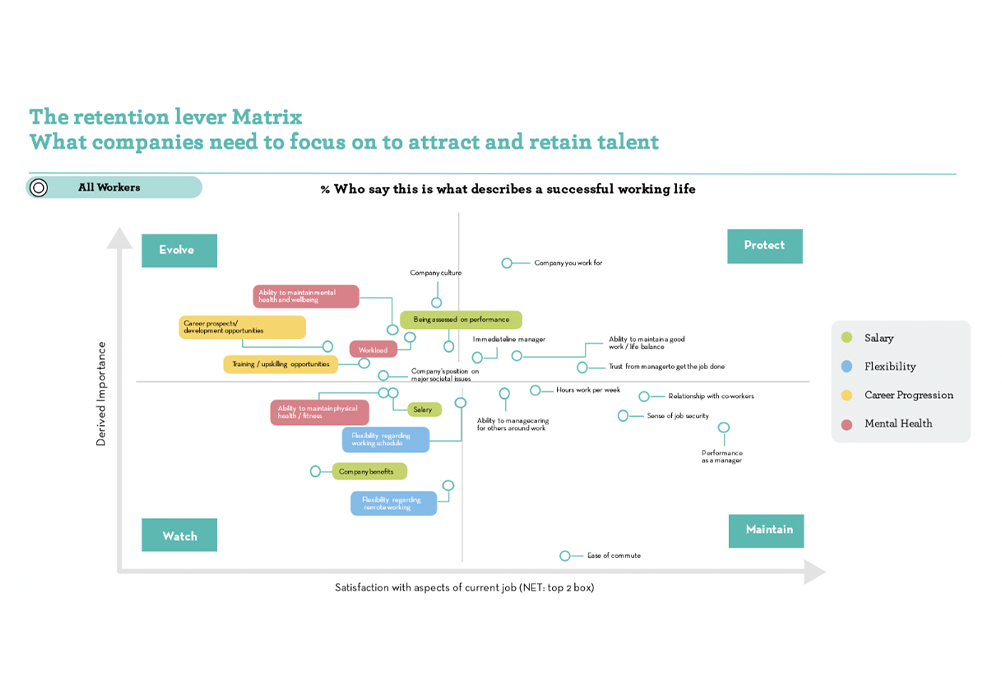To register for our 2022 Global Workforce of the Future report, click here.
The world of work, particularly in this post-pandemic era, is full of new terminology describing how professionals are changing their relationship to their jobs, the space their work takes up in their lives, and what fulfilment to expect from it. The latest addition to our work vernacular is “quiet quitting,” a term that implies reduced dedication but in fact represents a sensibility shift to well-being, healthy work engagement, and mostly a balance that allows talent to focus on their work enough to succeed professionally but not so much as to burnout and fail elsewhere in their lives.
Statistics show that work dominates some people’s lives to the point of damaging physical and mental health. According to our new research, the Global Workforce of the Future: Unravelling the Talent Conundrum, only 17 percent of workers take a sick day when feeling mentally unwell or burned out. There’s a stigma attached to taking allotted time off to keep yourself well that is driving many employers into burnout. Only 3 in 10 workers use all of their holiday time off—which, if you work in the U.S., is already going to be a fraction of your international colleagues.
Quiet quitting might present a solution: Is it time to re-assess how much of our lives we dedicate to our jobs, while still being ambitious, contributing workers?
What is quiet quitting?
Like many trends, quiet quitting gained momentum on the social media platform, TikTok, with a video posted by @zaidleppelin that was viewed more than 3 million times. In it, Zaid Khan says, “I recently learned about this term called 'quiet quitting' where you're not outright quitting your job but you're quitting the idea of going above and beyond.”
The concept is self-explanatory: Hustle culture and pressure to give your absolute all—your time, your priority, regardless of consequence—to you job is in question. You can burn out or quit, or you can step back and put your job in its proper bandwidth capacity in your life. You don’t have to commit all of you to your job. You can do enough, do it well, and feel good about it. Quiet quitting is boundary setting; a way of staying in your job but no longer allowing it to dominate all your time and energy.
Defining work satisfaction today
One aspect of this noticeable shift away from workers’ willingness to pour themselves entirely into their jobs, going beyond actual job expectations and committed working hours, is workers today are concerned with more than money.
Salary, while important and still a key element of job satisfaction, is no longer the main driver of why we work, and is losing its “carrot” capacity in encouraging people to go that extra mile at work. Work-life balance, feeling passionate about your work, feeling happy each day with what you do… these are all factors that are trumping a baseline salary in terms of what motivates today’s workers, and how we measure success.

What motivates workers, and what factors are most key to retaining talent in the workplace? Our research points what we call retention levers: salary, flexibility, career progression opportunities, and mental health protection.
Corporate culture and an organization’s stance on social and moral issues are also gaining massive traction; people want to work for places that work for the good of society, and companies are now more pressured to voice their position on issues as far ranging as the environment and abortion.
Quiet quitting and burnout
Almost a quarter of workers have taken a career break due to burnout, and almost 4 in 10 admit to suffering burnout only in the last year. A workforce of emotionally drained workers can have a high cost for companies, not only in productivity but also in morale, creating a toxic work environment.
Keeping top talent motivated and engaged in their work looks different today than in the past. The Covid-19 pandemic exacerbated this shift by giving workers the space to design their own workdays and tempos and set boundaries in terms of when they work, how they work, and how they balanced family life, mental health, fitness, and hobbies within that structure. This came also in response to another Covid impact, in which workers felt initially compelled to take phone calls and participate in meetings or answer emails at all hours.
According to a USA Today article, many Americans who have grown to prefer the working at home model, at least part of the time, were initially at higher risk of burnout because their workday had become so fluid.
In short, employees have experienced the benefits of this level of autonomy and are far less willing than before to surrender it. And they want more return on their time, intellectual, and creative investment in their jobs.
Employees are now determined to stick within the parameters of their job descriptions, and less willing to sacrifice to go that extra mile. This has been made possible by widespread labor shortages that have given workers more leverage over their employers. As a result, many workers are moving to doing just the bare minimum.
How employers should respond to the quiet quitting craze
So, what can employers do? In our research, we identified a new way of prioritising retention efforts by comparing current satisfaction with the importance of several retention factors. Our model has four categories:
-
The first two are areas that companies should prioritise: 1) ‘evolve,’ which includes career development and upskilling, as well as ability to maintain mental health and wellbeing, and 2) ‘watch,’ which includes salary and flexibility.
-
The final two categories are comparatively less urgent factors to address, but they must be protected and maintained: 3) ‘protect,’ and 4) ‘maintain.

Basic steps employers can take is to ensure that employees avail of the time-off policies, including sick leave and vacation days, that are allotted to them in their employment contracts.
According to our research, encouraging workers to take their full annual leave, creating a culture of trust and safety, and allowing sick leave for mental health are the top three must-have measures companies should implement to support workers well-being.
Workload, ability to maintain mental and physical health and wellbeing are at the bottom of the list on workers’ satisfaction. Creating safe environments that promote workers resilience is key.
“Quiet quitting" means workers are now prepared to reject the notion that work is their life and that they should work beyond their job descriptions to succeed. This means they will be less willing to take on extra work, volunteer for committees, or answer work communication beyond the workday hours. Workers are becoming more selective about the projects they want to participate in or the types of job function they are interested in pursuing.
This no doubt puts the onus on employers to keep their people happy and motivated, because the threat of losing a job that makes you unhappy is no longer enough of a driver, particularly to Gen Z workers who have been shown to be more risk-averse and less fearful of losing a job than older workers.
Key Takeaways
The relationship and power between employees and employers have undoubtedly shifted. The Covid pandemic is just one aspect of this, albeit a significant one. Our work and home lives blurred in ways that revealed an imbalance in how we’d been doing things for too long: prioritizing work to the neglect of our health and relationships and broader wellbeing and feeling pressure to go far beyond our working hours and responsibilities in order to feel secure in our jobs.
The addition of Gen Z to the workforce is also a big factor, as this new group of young talent are far more aware of their personal needs for both job and life satisfaction, and openly less interested in participating in their own exploitation in work. This has created a new dynamic for employees and employers, one in which managers will have to be mindful and respectful of the limits to which their talent is willing to go.
But this need not be bad news for team leaders and hiring managers: with a little emphasis on maintaining positive mental and physical health, allowing for boundaries to be set and respected, and ensuing employees feel confident that doing the work they’ve signed up for is enough, more organizations will be able to recruit and retain talent that will be less vulnerable to burnout and more likely to feel satisfied and engaged in their work.


